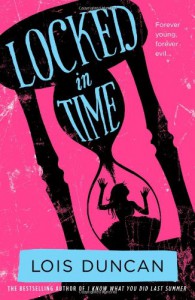Locked in Time: Tuck Everlasting + Suspense

I am a child of the seventies, and read Lois Duncan in her first issuance. This is actually one of her later novels, first published in 1986, two years after I graduated from high school. I had long since moved on from Lois Duncan by the time it was released, to college and literary fiction. But I always remember the spine chilling awesomeness of Summer of Fear, I Know What You Did Last Summer, and, especially, Down a Dark Hall, which remains - along with Amityville Horror - one of the terrifying peaks of my personal experiences with horror as an adolescent.
In 2010 and 2011, seeing the opportunity to scare the pants off a new generation of adolescents, Little Brown redesigned Duncan's oevre with flashy and appealing new covers, and asked her to update them. Imagine my disorientation reading this:
“You have your cell,” Lisette said. “Why do we need a landline?” “I don’t like doing business on a cell phone,” Dad said. “Calls are always getting dropped, and the thing never stays charged.”
In a book that I knew was originally published sometime in the eighties. When this book was published, cell phones looked like this:

And the only people who could afford them were bazillionaires who worked on Wall Street in NYC.
I'm not sure how successful their updating venture was, but I can say that my daughter was around 15 when the books were issued, and shortly thereafter they went on kindle sale for $1.99 each, so I snapped them up. She read them all, two a day, one summer, and really did enjoy the hell out of them.
This is not her best, but probably isn't her worst, either. The writing ranges from adequate to occasionally downright lyrical in her descriptions of the Louisiana plantation and bayou. The suspense aspect itself is interesting, but is really not all that scary. It's sort of a Tuck Everlasting story, and again explores the idea that never aging is maybe not the panacea that one might think. Being perpetually 13-years-old would be an unalloyed suckfest, after all, and the implications of modernity are well-explored: because, of course, what does one do when one's birth certificate reflects a date of birth of 1882? Marry well and often, disposing of one's husband with alacrity, apparently.
I suspect that these books are not nearly as scary now as they were when I read them. The late seventies were, generally, a less media saturated time, and teens were exposed to much less in the way of horror, both fictional and real. The media obsession with crime had not yet taken hold, and while "if it bleeds, it leads" was probably still the motto for the news, the 24-hour cable news obsession had not yet been developed. Serial killers, sexual assault, sexual abuse, pedophiles, these were all things that we knew, intellectually, existed, but they were remote to the point of feeling like we were invincible. Teens today know more, and the subtle frights present in Duncan's books are tame compared to The Purge, or The Saw, or, even, Supernatural.
This was a fun little walk down memory lane. Duncan is one of those writers whose books are so intertwined with my youth that reading her is like standing over my tween shoulder and listening to a voice from my past.






 21
21
 5
5
